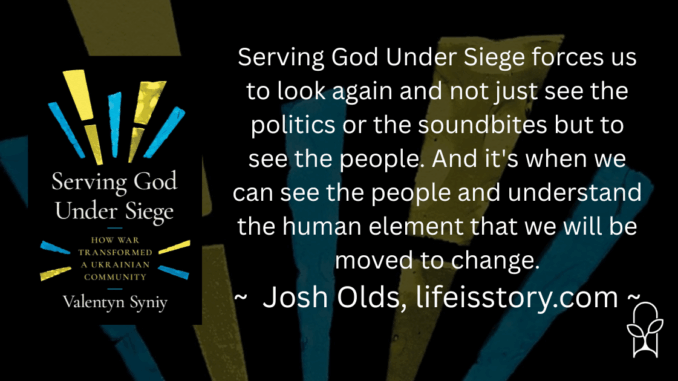
Published by Eerdmans on October 9, 2025
Genres: Non-Fiction, Memoir
Buy on Amazon
Goodreads

When Russia invaded Ukraine, an evangelical seminary lost everything—except its commitment to serving God.
In this searing eyewitness account, Valentyn Syniy recounts how the Russian invasion of Ukraine in 2022 upended life for students, teachers, and staff of the Tavriski Christian Institute. As president of TCI, Syniy was responsible for evacuating the seminary community and leading them hundreds of miles to a safer location. Upon arrival, Syniy and his colleagues faced new challenges: where would everyone stay? How long would they live as refugees? How could ministry training continue during wartime?
What unfolded over the next nine months is a gripping story of faith and resilience amid fear and chaos. Displaced and dispossessed, TCI courageously embraced new forms of Christian service. They poured their energies into the town that was sheltering them, ministering to neighbors in need and facilitating activities for local youth. They drove into combat zones to help shuttle people to safety. Despite the devastating news that their campus back home had been destroyed, they carried on with their educational pursuits, holding classes in makeshift spaces.
While showing how the war impacted the seminary, Syniy also reveals how it affected him and his family—how within the chaos, for example, they carved out sacred space to celebrate his daughter’s wedding; how he worried about his elderly father, a pastor who refused to evacuate because he did not want to abandon his congregation; how it felt to see his home again after months of displacement and trauma. The result is a powerful account of the war’s impact on individuals as well as communities.
Serving God Under Siege occupies an important space in Christian writing about war. Syniy explores the same question that C. S. Lewis addressed in his classic sermon “Learning in War-Time”: how can an educational institution carry on when the world is falling apart? By exploring this question in a full-length book, Syniy is able to delve deeper and illuminate more complex answers. Serving God Under Siege is also a worthy successor to Corrie Ten Boom’s classic memoir The Hiding Place, insofar as it transports readers to a place where Christians are grappling with contemporary evil and trying to find ways to bear witness to Christ’s love. Simultaneously heartbreaking and inspiring, Syniy’s book is a must read for those who care about the global church and want to understand the human cost of the war in Ukraine.
On 24 February, 2022, Russia illegally and violently invaded Ukraine igniting the deadliest war on European soil since World War II. Hundreds of thousands have been killed, included tens of thousands of civilians. Out of a population of 41 million, 16 million Ukrainians have fled their homes creating a refugee crisis and putting the lives and livelihoods of many more into peril. Serving God Under Siege is the story of Valentyn Syniy, his escape from the Russian invasion, the continued ministry of Tavriski Christian Institute (TCI), and God’s provision through it all.
Syniy is the president of TCI, an evangelical Ukrainian seminary in Kherson. Despite ongoing Russian-Ukrainian conflicts for over a decade, Syniy and TCI were building a strong hub of Christian teaching in Ukraine—not only working as a seminary, but also translating and publishing Christian teaching. But when Russia invaded, all of that changed.
In its original Ukrainian, the title of this book translates to The Man Whose Home Was Stolen: The Fight for Freedom. Syniy writes that he chose this title because what he struggled with the most was his loss of home. Unlike many refugees, Syniy stayed in Ukraine. He didn’t necessarily have to struggle with the difficulties of being an immigrant, of learning a new culture and language, but the displacement was still very real. He had left his home and its memories—including irreplaceable family photos. His seminary had been invaded and was now a Russian military camp. This is a story of a man and a ministry who lost their place and yet persevered in their ministry.
At its core, this is a story of faith under fire. Syniy doesn’t shy away from the horror. He captures the daily terror of evacuation, the uncertainty of refugee life, and the emotional weight of being uprooted. But alongside that, he shows us how people clung to God—and to one another—through makeshift classrooms, hospital runs, delivering aid, even in combat zones. He writes about how he was able to use his seminary connections to pivot toward disaster relief and food aid and other humanitarian efforts. And all of this is told in striking detail. Syniy isn’t a dispassionate third-party observer. He’s in the middle of the fray, writing and reflecting on his life. But neither is this a monologue. Syniy weaves in stories of students, pastors, families, refugees, and the church outside Ukraine. You feel, as you read, how war fractures relationships—and how faith seeks to bind them back.
This is a needed book. As the war has dragged onward and—for Americans—other problems both foreign and domestic have captured the airwaves, there has been less information and less understanding of what is happening in Ukraine. Particularly with the current American political situation, Ukraine has been shuffled off to the side as a problem we don’t want to address. Serving God Under Siege forces us to look again and not just see the politics or the soundbites but to see the people. And it’s when we can see the people and understand the human element that we will be moved to change.
